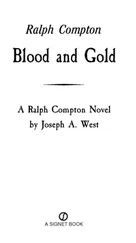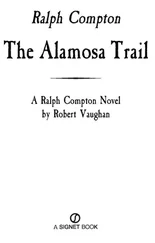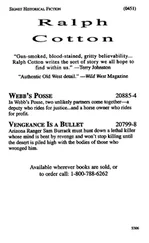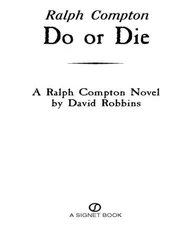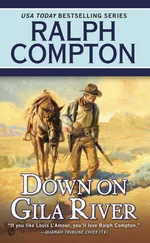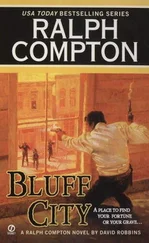Lake had seen his last town five days before, his last ranch three.
By his own count he was missing at least six meals, but he still needed to put a heap of git between himself and the Peacocks.
All four of them boys were gamblers, as their brother had been, and they were good hands with the Colt’s revolver.
And there was no backup in them. They’d keep a-coming, like a pack of starving wolves.
It is a comfort to a man to have a companion in woe, but Lake had none such.
Apart from himself, the only other visible living creature in the vast land was his yellow mustang. But the little horse was not much of a talker and pretty much kept his own counsel.
Lake calculated—rightly, it must be said—that the mustang didn’t give a shit about his woes anyhow.
The day began its slow shade into evening and Lake rode under a candy cane sky when he came upon the town of Requiem.
From a distance, it looked like any other town he’d known, a place where no one would be glad at his coming or sad at his leaving.
He sat the mustang, lit his pipe, and studied the burg.
The town’s only street was empty of people. More importantly, there was no sign of the Peacock brothers or their big American stud horses.
Truth to tell, there were no horses at the hitch rails, and, as far as Lake could tell, the street was unmarked by the passage of rigs and wagons.
He puffed on his pipe, a careful man thinking things through.
It was almost suppertime, so that explained the empty street. People would be home, settin’ around the table or singing around the piano or whatever civilized folks did of an evening.
Lake had no way of knowing. He’d spent little time under a roof and none within the sound of church bells.
In the past he’d been an army scout, stagecoach guard, tin-pan gold prospector, lumberjack, railroad-track layer, cow-town peace officer, and for three months, before he’d given it up as a dead-end career, train robber.
Nothing he’d ever done was easy and nothing had come to him easy either. Some folks get life handed to them on a plate, but the plate had always been washed clean before it ever came around to Mash Lake.
He’d never lived with a woman who might have tamed him and helped him settle down in one place. He’d shared a bed with whores, of course, but they weren’t the marrying kind.
Now, about to enter the seventh decade of his existence, life and the living of it had whittled him down to skin, bone, and whipcord muscle. He was tough, enduring, with no softness in him.
And he was a hard man to kill.
If he’d been asked, Lake could name four men who’d tried.
There was Bill Foran, a wannabe bad man back in the Nations. Foran had drawn down on Lake and it was the last mistake he’d ever made.
He’d outdrawn and killed Cedar Creek Hamp Lawson up Tin Cup way in Colorado, and three years later the Texas gunman John T. Walters, who’d called him out on Christmas Eve in El Paso over a two-dollar gambling debt.
Earl Peacock was the most recent, and at thirty years old he should have been of an age enough to know better than to draw down on a mean, grumpy geezer with the whiskey on him.
Peacock had pulled his gun after Lake spotted his crooked deal at Chuck-A-Luck.
The gambler had cussed him for a doddering old fool who didn’t know his ass from a gin whistle and ordered him to skin iron.
An instant later the young man learned the hard way that in a belly-to-belly gunfight, age doesn’t matter a damn.

Only one lamp burned in the town, a firefly in the darkness, and Lake thought that mighty unusual, since the night was starting to crowd closer and the shadows were stretching long.
But he needed a meal and a place to sleep, and both beckoned to him.
“The hell with it,” he said aloud, to no one but himself, as is the habit of men who ride lonely trails. “Let’s see what’s shakin’ in this burg.”
He kneed the mustang into motion and headed into Requiem.
Later he would curse himself for not riding on and taking his chances along the Rim country.
Chapter 15
Mash Lake drew rein at the marshal’s office, where a lamp burned, its two front-facing windows rectangles of orange light.
Around him the town lay dark and dead and only the prowling wind took any interest in his being there, sniffing him all over before moving on.
A horned moon began its climb into the sky, and the buildings along the street took on a ghostly sheen, their false fronts looming over Lake as though they were going to reach down and grab him.
Somewhere a door banged on its hinges. A feral dog barked. Blown sand sifted against the mustang’s legs. Lake’s saddle creaked. He heard his own breathing in the quiet. The dog barked again.
And suddenly the marshal’s office went dark.
Lake’s hand rested on the ivory butt of the Remington holstered across his belly.
“What the hell do you want? State your business.”
A man’s voice from inside the cabin—rough, unfriendly, and demanding.
“Lookin’ fer a square and a bed for the night,” Lake said.
“I got faith in this here rifle gun,” the man said. “She shoots right where I aim her.”
Deciding that the circumstances demanded a fast burnish of his bona fides, Lake said, “It’s only me, ol’ Mash Lake as ever was. Friend to all, enemy to none.”
The marshal, or whoever he was, had the good grace to put a grin in his voice.
“Real true blue, ain’t you, fer a night rider?”
“Lost my way,” Lake said. “Seen your light. Pegged this burg as a place where I could get a bit o’ supper an’ a bed. Seems like I pegged it wrong.”
“That depends,” the man inside said.
“On what?”
“On me,” the man said.
The office door opened and Lake saw a tall, thin feller walk out, then immediately step into shadow.
“Light,” the man said. “And keep your hands where I can see them.”
A moment’s pause, then, “Mister, right now I’m nervous and when I’m nervous I get scared and when I get scared bad things happen.”
Lake stepped out of the saddle, his hands high.
“No reason to be sceered of ol’ Mash Lake, as mild-mannered a cove as you’ll find in a day’s ride in any direction.”
“Around here, that don’t cover a lot of folks,” Pace said. “Come on in slow and grinnin’, like you was bringing a fruitcake to Grandma.”
Lake left his horse at the hitch rail and followed Pace’s motioning rifle into the office.
He saw Jess and swept off his hat. “Pleased to make your acquaintance, ma’am,” he said. “You must be the marshal’s lady wife.”
“She’s my prisoner,” Pace said. “Now shuck your gun belt and lay it there on the desk.”
Lake did as he was told.
“Why are you in Requiem?” Pace said.
“Strange name fer a town,” Lake said. “Makes me think o’ death and Judgment Day.”
He read the irritation in Pace’s face and said quickly: “I’m just passing through, Marshal, comin’ from one nowhere, goin’ to another nowhere.”
Lake scratched a bearded cheek. “Well, that ain’t the whole story. I also got a hanging posse on my back trail.”
“Why for that?” Pace said.
“Killed me a crooked gambler.”
“Hell, gunning a base dealer ain’t breaking the law. Nobody’s going to blame you for that.”
“Ah, well, his four brothers don’t think that way. Narrow-minded gents, an’ no mistake.”
Lake’s eyes strayed to the window. “They’ll come for me, if’n they ain’t here already.”
Chapter 16
Читать дальше


